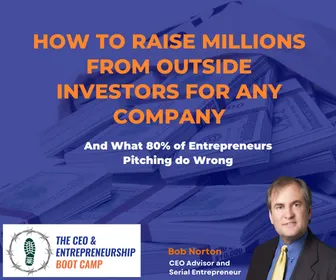Becoming a Great CEO: Seven Essential Tips
Being a CEO is akin to mastering an art form—it is one of the most complex jobs in the world, surpassing even the controls of a B2 bomber. The key difference is that some of those controls in the CEO role are people, and their actions can never be fully predicted. Imagine landing a B2 stealth bomber in challenging weather conditions without knowing the function of each control. Sometimes being a CEO feels like that. This analogy aptly captures the intricacies of running a company, even one with just a dozen employees.

It is important to spend time “sharpening the saw”. This should be a multifaceted approach and include several regular self-improvement efforts put in your schedule:
To excel as a CEO, it is crucial to dedicate time to “sharpening the saw,” engaging in various self-improvement endeavors. I believe constant reading and learning is always required to excel.
Here are some essential practices to incorporate into your schedule:
- Focus on your strengths and delegate tasks you do not enjoy. People rarely perform well in areas they do not find fulfilling, and often avoid the necessary work. Utilize administrative assistants, interns, and other staff members to handle tasks that you dislike. Ensure that these tasks serve as learning opportunities for those individuals rather than mere busy work. Everyone, especially top performers, craves challenges and growth. Appreciating their work and expressing gratitude is often more important to them than monetary compensation. Frankly, I make this mistake all the time because I do not love sales and marketing, but I have to do some because I do not have a CMO right now. Most early-stage companies cannot afford to dedicate employees for many roles and need to leverage fractional CEOs, CMOs, COOs, CXOs.
- Seek guidance from a mentor or coach who has previously accomplished what you aspire to achieve. Ideally, find someone with over ten years of experience as a CEO. In the past, a five-year apprenticeship was common for mastering complex skills or arts, and the role of a CEO is no different. Many so-called “Business Coaches” lack significant experience in building successful businesses, and certifications in coaching hold limited value. Practical experience in management, sales, marketing, operations, finance, leadership, and other disciplines is crucial. Learning on the job is deadly for startups.
- Embrace reading as a means of learning from the masters and industry gurus. Over the course of 20 years, I have read an average of 4+ books per month, accumulating a wealth of knowledge. While not every book was completed due to poor quality or redundancy, I supplemented my reading with book summaries and audiobooks. In fact, twice a day walking my boxer and getting exercise I listen to Audible. That’s an hour a day of reading seven days a week, or 365 hours per year. And that’s doing three things at once ;0) Early in my career I spent 30 to 60 minutes daily, listening during my commute and even at home. Continuous learning is paramount for a CEO since there are limited opportunities for personal growth within their own companies. Reading is just one tool among many in a comprehensive lifelong learning program. There is no substitute for this dedication—it allows exploration of unknown territories and constant improvement. Being a CEO is more of an art than a skill, learned through experience and the application of fundamental principles. However, you can learn and get those principles from books cheaply.
4. Remain flexible and adaptable rather than being rigid in your ways. Constantly evolve and learn, as many people become trapped in methods that were successful in the past but are no longer suitable for a growing company with changing circumstances. Avoid making reflex decisions and carefully consider all variables involved. Failure to adapt has led to the demise of once-great companies like DEC and Wang, as they were unable to accept the new realities of the marketplace and adjust their strategies and focus. I have witnessed numerous business owners become neuroplastized, adhering to one fixed way of doing things while the world changes around them. Consequently, their companies stagnate or, worse, face extinction. CEOs must evolve their management style from dictatorial in small startups to collaborative, placing trust in an experienced management team. Without this growth, surpassing $5 million in revenue becomes nearly impossible.
5. Network with other CEOs and actively participate in industry events to directly engage with customers and competitors. CEOs can become isolated, receiving filtered information that may lead to poor decision-making. It is vital to create an environment where people feel comfortable “speaking the truth to power”. Publicly reward this behavior to prevent being surrounded by sycophants and yes-men. I literally tell people “If you do not disagree with me sometimes, I don’t need you”. That’s raw truth. Screw being “politically correct”. Serious people need to hear the truth and have thick skin. You cannot be in the c-suite without that fact, data and science-based feedback mentality. And this also shows integrity.
Learn more about our Growth and Scaling (GSP) Certification program for Managers, click here
6. Surround yourself with intelligent and experienced individuals who you can trust and listen to, rather than simply talking at them. Avoid hiring solely based on cost, particularly in high-risk areas. Every company requires strong marketing and innovation above all else, but operational excellence is sometimes a crucial skill for growth. Aim for a ratio of one seasoned manager for every seven employees in your company (span of control ratio). Entrepreneurs who attempt to do everything themselves get stuck in micromanagement, hindering both personal and professional growth. Great companies are built by teams, not superheroes. And they train their people to bring them all their problems. Two of my favorite phrases are “I trust you to figure it out” and “Use your best judgement”. This is how people grow. And growing people is the job of any leader.
7. Learn and implement “Best Practices” by benchmarking processes and departments with relevant metrics. As Peter Drucker famously stated, “You cannot improve what you do not measure.” Encourage a process-oriented mindset within the company to foster continuous improvement, documentation, and facilitate the training of new employees. While frameworks like Six Sigma may be too extensive for small companies, they offer a valuable mentality. Scaling smoothly is impossible without a corporate dashboard and department-specific dashboards, which define success, focus, and how individuals are evaluated and rewarded. We created AirTight System #4, Process Management, to be the 80-20 solution for small companies. It is a convention for process management, documentation and optimization that requires very little training, mostly just examples.
For a free video consultation, call on what your company and team need to scale better, click here
Bonus Tip – If you want to grow a significant company then be sure to attend The CEO & Entrepreneur Boot Camp www.CEOBootCamp.us. It will give you a foundation to build on in all key areas and a roadmap for most things in starting a new business. This is 14 courses. An we also have our Master of Business Acceleration (administration is easy). This is forty courses that is better than getting an MBA, and can be done in weeks, not years.

Free Webinar Replay
How to Raise Millions from Outside Investors for any Company – Learn the 30 other sources of capital beyond angel and VC and how to prepare a company and get it into the top few percent investors see.
Allow five years to become a good CEO and ten years to become a great one. Like any other true art, it requires lots of experience, not just education.
No one ever started out painting the Mona Lisa. And the few that grew a significant company as their first venture always hired highly experienced talent.
Bob Norton is a long-time Serial Entrepreneur, CEO and investor who founded six companies with four exits that returned over $1 billion to investors for a 25X ROI. Two others are still in development. He has trained, consulted and advised thousands of Entrepreneurs, CEOs and boards since 2002. Mr. Norton works with companies to 2X to 10X growth rates and valuation using AirTight Management™, the world’s most comprehensive Leadership Operating System. He also helps companies raise capital to fund growth. He is also the Founder of The CEO Boot Camp™ and Entrepreneurship University™ for early-stage companies that have not reached product-market fit and $1M ARR.
What can we help you with today? Scaling, training, consulting, coaching?
Call (619) SCALE06 or (619) 722-5306 9am-6pm CT
Or Schedule a free 30-minute strategy session by clicking here.


